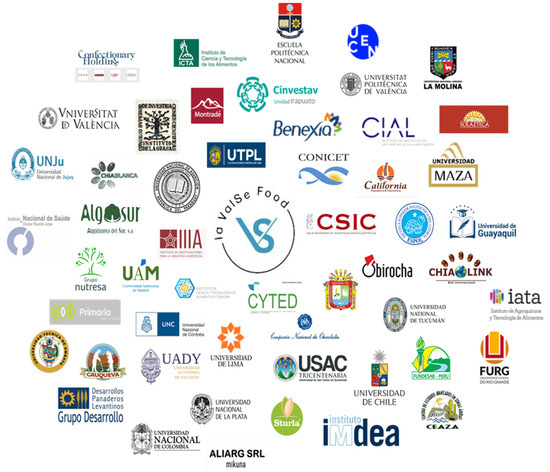1. Introduction
The V International Conference la ValSe-Food and VIII Symposium Chia-Link: Feeding Biodiversity and Mitigating the Effects of Climate Change: the Role of Ancestral Crops in Creating Healthy Food is organized by the International la ValSe-Food (Iberoamerican Valuable Seeds or Valiosas Semillas Iberoamericanas) Network—CYTED. The conference was held from 4 to 6 October 2023 in Valencia, Spain.
Ancient grains refer to a category of grains that have been cultivated for thousands of years and have remained largely unchanged by modern plant breeding practices. These grains have a long history as staple foods in various cultures around the world. Ancient grains have gained popularity in recent years due to their nutritional benefits, unique flavours, and potential health advantages compared to modern grains. They are often sought after for their higher fibre, vitamins, and mineral content, as well as their potential to be more easily digested by sensitive populations.
In addition to promoting safe, sustainable, nutritious, and healthy food, la ValSe-Food Network also recognizes the importance of biodiversity and addressing climate change. The network acknowledges that ancient crops play a crucial role in preserving biodiversity and enhancing resilience in agricultural systems.
By studying and promoting ancient seeds, the network aims to contribute to the conservation of genetic diversity. Ancient grains possess unique, naturally selected genetic traits over centuries, making them valuable resources for future breeding programs and the development of climate-resilient crops. Preserving and utilizing ancient seeds can help to maintain biodiversity and protect against the loss of valuable genetic resources in the face of climate change and other environmental challenges.
The aim of la ValSe-Food Network is to establish a framework which brings together scientific, technical and industrial groups who work in all areas related to ancient crops (Figure 1).

Figure 1.
Scientific, technical and industrial groups involved in la ValSe-Food Network.
The overall objective of the Network is to create a cooperative environment with the international scientific community to promote safe, sustainable, tasty, nutritious and healthy food with ancient crops via collaborations among the sectors involved in it: research, institutions, industry and society.
In addition, the aim of the International la ValSe-Food Network is to promote the sustainable development of science and technology based on the study of ancient seeds.
2. Topics
The conference was structured into different sections to cover various topics related to agriculture, food technology, nutrition, health promotion, and climate change.
- Session I: Agronomy and Crop Diversity
- Session II: Climate Change and Food Systems; Innovations in Food Science and Technology; Sustainable Management of Food Waste
- Session III: Research in Food and Nutrition; Food Chemistry and Bioactive Components of Foods; Food Immunology
Each section included keynote presentations, research paper presentations, panel discussions, and interactive sessions to facilitate knowledge exchange and collaboration among participants. The conference addressed a wide range of topics, fostered interdisciplinary discussions, and promoted holistic approaches to sustainable agriculture, food technology, nutrition, health promotion, and climate change.
3. Committees
3.1. Conference Chair
- Claudia Mónika Haros
- Coordinator of la ValSe-Food
- Cereal Group, Instituto de Agroquímica y Tecnología de Alimentos, Spanish Council for Scientific Research (IATA-CSIC), Valencia, Spain
3.2. Conference Co-Chairs
- Loreto A. Muñoz
- Coordinator of Chia-Link Network
- Instituto de Investigación y Postgrado, Facultad de Medicina y Ciencias de la Salud, Universidad Central de Chile, Santiago, Chile
- Mª Dolores Ortolá Ortolá
- Instituto Universitario de Ingeniería de Alimentos-FoodUPV, Universitat Politècnica de València, Valencia, Spain
3.3. Scientific Committee
- Claudia Mónika Haros
- Coordinator of la ValSe-Food
- Cereal Group, Instituto de Agroquímica y Tecnología de Alimentos, Spanish Council for Scientific Research (IATA-CSIC), Valencia, Spain
- Francisco Millán
- Instituto de la Grasa, Spanish Council for Scientific Research (IG-CSIC), Seville, Spain
- Javier Fontecha
- Instituto de Investigación en Ciencia de la Alimentación, Spanish Council for Scientific Research (CIAL-CSIC), Madrid, Spain
- Jose Moises Laparra
- Instituto Madrileño de Estudios Avanzados (IMDEA-Food), Madrid, Spain
- Loreto A. Muñoz
- Coordinator of Chia-Link Network
- Instituto de Investigación y Postgrado, Facultad de Medicina y Ciencias de la Salud, Universidad Central de Chile, Santiago, Chile
- Ma Carmen Millán Linares
- Instituto de la Grasa, Spanish Council for Scientific Research (IG-CSIC), Seville, Spain
- Mª Dolores Ortolá Ortolá
- Instituto Universitario de Ingeniería de Alimentos-FoodUPV, Universitat Politècnica de València, Valencia, Spain
- Maria Reguera
- Autonomous University of Madrid, Madrid, Spain
- Octavio Paredes-López
- Centro de Investigación y de Estudios Avanzados (CINVESTAV), Irapuato, Mexico
3.4. Organizer Committee
- Ana Ribera Castelló
- Cereal Group, Instituto de Agroquímica y Tecnología de Alimentos, Spanish Council for Scientific Research (IATA-CSIC), Valencia, Spain
- Andrea Alonso Álvarez
- Cereal Group, Instituto de Agroquímica y Tecnología de Alimentos, Spanish Council for Scientific Research (IATA-CSIC), Valencia, Spain
- Claudia Mónika Haros
- Cereal Group, Instituto de Agroquímica y Tecnología de Alimentos, Spanish Council for Scientific Research (IATA-CSIC), Valencia, Spain
- Mª Dolores Ortolá Ortolá
- Instituto Universitario de Ingeniería de Alimentos-FoodUPV, Universitat Politècnica de València, Valencia, Spain
- Mª Luisa Castelló
- Instituto Universitario de Ingeniería de Alimentos-FoodUPV, Universitat Politècnica de València, Valencia, Spain
- Sofía Blanco Haros
- University of Valencia, Valencia, Spain

Funding
This Conference was financed by the Project Ia Valse Food-CYTED (Ref. 119RT0567) and CIAORG/2022/123 from a Conselleria d’Innovació, Universitats, Ciència i Societat Digital (Valencia, Spain). The Accreditation of IATA-CSIC as Center of Excellence Severo Ochoa CEX2021-001189-S financed by MCIN/AEI/10.13039/501100011033 is fully acknowledged for the holding of this Conference.
Disclaimer/Publisher’s Note: The statements, opinions and data contained in all publications are solely those of the individual author(s) and contributor(s) and not of MDPI and/or the editor(s). MDPI and/or the editor(s) disclaim responsibility for any injury to people or property resulting from any ideas, methods, instructions or products referred to in the content. |
© 2023 by the authors. Licensee MDPI, Basel, Switzerland. This article is an open access article distributed under the terms and conditions of the Creative Commons Attribution (CC BY) license (https://creativecommons.org/licenses/by/4.0/).